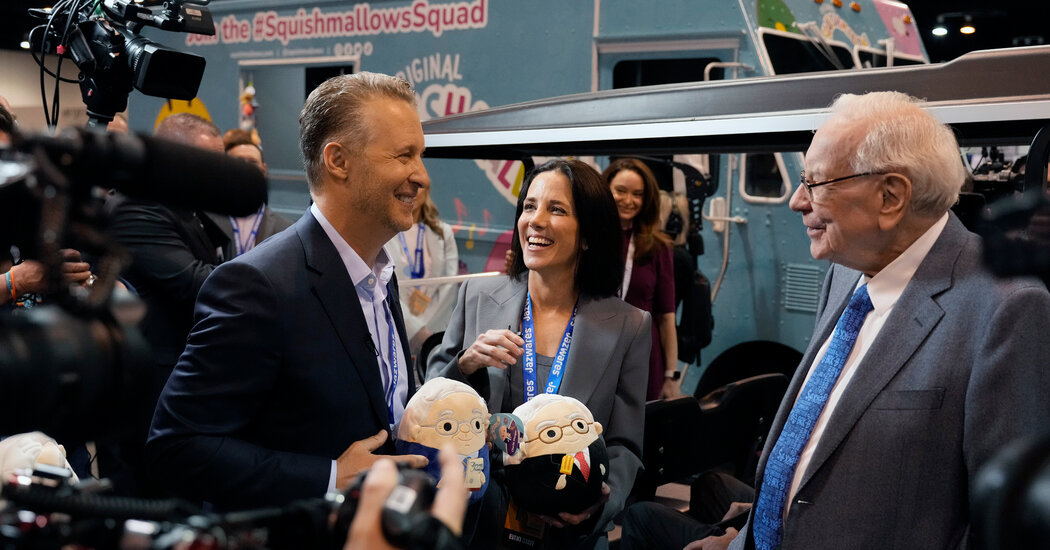Berkshire Hathaway reported a six-fold increase in its first-quarter earnings on Saturday, bolstered by huge paper gains on investments as the conglomerate led by Warren E. Buffett held its annual shareholder meeting in Omaha, his hometown.
Berkshire, whose extensive businesses include insurance, railroads, utilities and consumer goods, said it earned $35.5 billion in the first three months of the year, compared to nearly $5.6 billion in the year-ago quarter.
With its broad scope of activity, Mr. Buffett’s company is often regarded as a representative of the US economy, and its results reflected some of the key trends of the moment, including the war in Ukraine, higher interest rates and fuel prices, and a fall in the US economy. economy. down in consumer spending.
Berkshire’s profit increase was driven by $31.1 billion in unrealized gains on the investments the company makes using the deluge of cash it collects from its insurance operations. That far exceeded the gain of about 7 percent in the S&P 500 stock index during the quarter.
But as always, the company cautioned that it considers paper gains or losses on its investments “meaningless” for understanding underlying financial health given its volatility. According to the company’s preferred measure of operating income, which excludes many of those capital gains, Berkshire earned $8.07 billion for the quarter, up 12 percent from the prior year.
Other core parts of the Berkshire machine reported more mixed results.
The Insurance business reported $911 million in net insurance income, particularly supported by the Geico division, which benefited from higher policy premiums and fewer claims. It also cut spending on its famous advertising campaigns.
Berkshire’s giant BNSF railroad, one of the largest freight networks in the country, posted a slight decline in net revenues, to $1.2 billion. The company said that while the company benefited from charging higher fuel surcharges and per-car rates, it was hit by rising fuel costs and lower shipments.
The energy and utilities division reported a sharp drop in net profit as higher operating expenses offset an increase in revenue and customer usage.
Other companies that underperformed in the quarter included the building products group, with its housing company Clayton Homes, which suffered a slowdown in the housing market due to a rise in interest rates, as well as its consumer products businesses such as the Forest River line of recreational vehicles and underwear from Fruit of the Loom. “The decline in apparel sales,” said Berkshire, “was driven by lower volume as order delays and order cancellations continued in response to increased inventory levels from corporate retail customers.”
During the quarter, Berkshire continued a series of share buybacks, repurchasing $4.4 billion of its own shares. Mr. Buffett increasingly relies on the financial maneuver to bolster his company’s performance and use some of his cash supply to make up for the shortfall in his signature big acquisitions.
Berkshire said it has doubled its stake in Pilot, which operates a chain of truck stops, to 80 percent. It also sold $13.3 billion worth of stock during that period.
The results were released on Saturday as tens of thousands of Berkshire shareholders flocked to Omaha for the company’s 59th annual meeting, largely to hear directly from Mr. Buffett. Long known as the “Woodstock for Capitalists,” the hour-long event sees Mr. Buffett and his longtime lieutenant, Charlie Munger, answer questions on a wide variety of topics.
This year’s meeting is expected to carry additional weight for many shareholders. Given the age of Berkshire’s leaders — Mr. Buffett will be 93 this summer and Mr. Munger is 99 — it’s unclear how many more meetings the two will preside over.
That said, Mr. Buffett has laid out a plan for his empire’s succession: his son Howard will become non-executive chairman, while Gregory Abel, a vice chairman who oversees much of Berkshire’s non-insurance business, becomes CEO. Todd Combs and Ted Weschler, who have overseen parts of Berkshire’s investment portfolio for years, would oversee it all.

